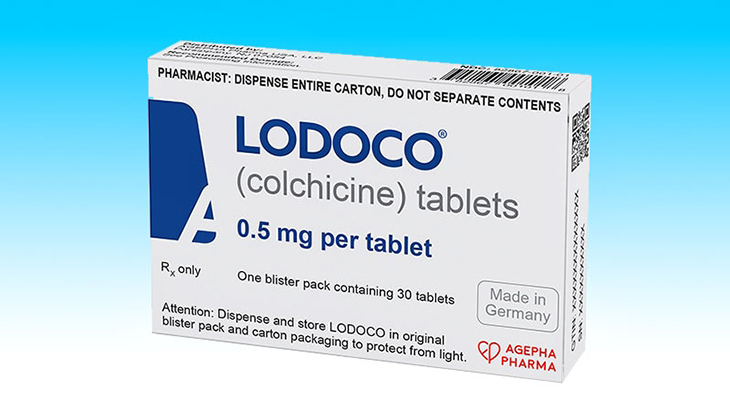
Colchicine, a time-honored remedy employed for millennia against inflammation and gout, has now gained approval from the U.S. Food and Drug Administration (FDA) for mitigating inflammation within the cardiovascular system, a pivotal factor contributing to heart attacks and strokes.
This green light from regulators marks a significant development, as colchicine was previously sanctioned for treating gout and other inflammatory ailments. Its new application is to diminish the incidence of heart disease events, particularly in individuals grappling with atherosclerosis—a condition characterized by the arterial walls thickening and hardening due to the accumulation of plaque.
Agepha Pharma, the pharmaceutical company behind the drug, announced that the FDA’s approval encompasses its use in adults diagnosed with atherosclerosis as well as those harboring multiple risk factors for cardiovascular disease.
These high-risk patients typically rely on statins to lower their susceptibility to heart disease events, such as heart attacks and strokes. When combined with colchicine, this therapeutic duo has been shown to yield promising outcomes, reducing the risk of death from heart disease and the occurrence of nonfatal heart attacks or strokes by a noteworthy 31 percent when compared to a placebo, according to the company’s statement.
“With colchicine, we now for the first time have access to an anti-inflammatory agent that actually works, decreasing the risk of cardiovascular events, and that is also very safe to use and affordable,” said Guillaume Marquis-Gravel, MD. He is an interventional cardiologist at Montreal Heart Institute as well as an assistant professor at the University of Montreal.
“This is a real breakthrough,” Dr. Marquis-Gravel added. It must be noted that he has no financial ties to Agepha Pharma.
Heart Attack and Stroke Risk Oftentimes Brought about by Inflammation
For decades, scientists have recognized the pivotal role of inflammation in the progression of atherosclerosis and its clinical repercussions, such as heart attacks and strokes, as highlighted by Marquis-Gravel. However, attempts to develop specific medications targeting cardiovascular inflammation have been largely unsuccessful due to their ineffectiveness or the presence of hazardous side effects.
Recently, the FDA granted clearance for Lodoco pills, containing 0.5 milligrams to be taken once daily. These pills can be used either independently or in conjunction with cholesterol-lowering medications like statins to combat inflammation within the cardiovascular system, which is a primary contributor to atherosclerosis, heart attacks, and strokes. It’s worth noting that Colchicine, initially approved by the FDA more than a decade ago for treating gout, also holds approval for addressing familial Mediterranean fever—an inflammatory condition characterized by acute abdominal, chest, and joint pain.
Colchicine – A Medicine Often Used for Inflammation
Many centuries ago, colchicine had a multifaceted history, finding itself in divergent roles across ancient civilizations. According to historical records from the Royal College of Physicians of Edinburgh, this compound served as both a deadly poison in ancient Rome and a therapeutic remedy for various ailments, particularly joint pain and inflammatory conditions, in ancient Egypt.
Colchicine’s origins trace back to the Colchicum autumnale plant, commonly referred to as autumn crocus. This plant, though aesthetically pleasing with its vibrant blossoms, concealed a potent and dual nature within its chemical makeup. It is from the seeds of this flowering plant that colchicine is derived, giving rise to its diverse applications.
In the context of ancient Rome, colchicine was employed with sinister intent, used as a poison to eliminate adversaries and rivals. Its toxicity was harnessed to deadly effect in various political and personal vendettas during this era, making it a notorious substance associated with treachery and danger.
On the contrary, in the land of ancient Egypt, colchicine was cherished for its potential therapeutic benefits. The compound was utilized as a remedy for the agonizing discomfort of joint pain and various inflammatory disorders. This application reveals a remarkable understanding of the medicinal properties hidden within the autumn crocus, as ancient Egyptian healers sought relief for their patients through this natural source.
The duality of colchicine’s historical roles underscores the complexity of humanity’s relationship with natural substances. It serves as a reminder that our understanding and application of compounds from the natural world have evolved significantly over time, from agents of harm to sources of healing. Today, colchicine continues to be studied and utilized for its therapeutic potential, especially in the management of conditions such as gout and certain cardiovascular diseases, demonstrating its enduring relevance in modern medicine.
“Colchicine is a very old drug, comes from mother nature, and was until now used for gout attacks,” Jan Hein Cornel, MD, PhD, said. He is a professor of cardiology at Radboud University Medical Center in Alkmaar, the Netherlands. He also has no financial ties to Agepha Pharma.
The rationale behind the effectiveness of this age-old remedy in averting heart attacks and strokes is grounded in the fundamental understanding of the role inflammation plays in the erosion or rupture of plaques within arteries afflicted by atherosclerosis, as explained by Dr. Cornel. The significance lies in recognizing that these plaques, when they dislodge, can traverse through the bloodstream and obstruct the crucial blood supply to the heart or brain, ultimately leading to devastating cardiac events or strokes.
“This means a tremendous step forward in the field of prevention of atherosclerotic cardiovascular disease,” Cornel stated.
Furthermore, Agepha Pharma has disclosed its plan to launch Lodoco, the innovative medication, during the latter half of 2023, with specific pricing details yet to be revealed. This introduction is anticipated to provide individuals with a promising solution to mitigate the risks associated with cardiovascular diseases, potentially revolutionizing the landscape of preventative medicine in the near future.



